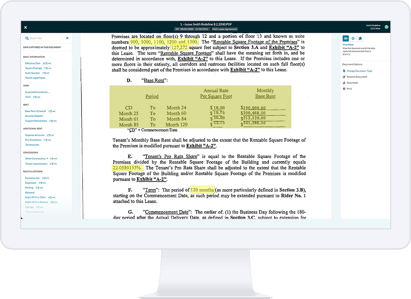Capital Markets Brokers: Day-to-Day Duties, Role Challenges, Skills, and More
Capital markets brokering is a highly specialized role in CRE, but not without its rewards and challenges. Read on to find out more about the day-to-day responsibilities of these professionals and the role they play in portfolio performance.

Almost every role in commercial real estate requires an individual to be highly skilled and specialized. Whether that’s in finance, market trends, or legalese, the CRE industry is complex and has high stakes.
For capital markets brokers who facilitate the sale and purchase of prominent commercial real estate assets, they need to be extremely versed in the due diligence process, capable of successfully closing or initiating a CRE deal while maintaining the interests of their clients. In addition to being incredible negotiators, these individuals are often highly detail oriented with extensive backgrounds in finance.
If you’re at all curious about the daily responsibilities of purchase/sale brokers, read on to discover more about the intricacies of the role and the difference between acquisitions brokers and landlord/tenant rep brokers. If you are a capital markets broker, find out how Prophia plays a big role in deal brokering and the ability to expedite due diligence and deal completion.
Jump To A Section in This Article
What Is a Capital Markets Broker?
Key Responsibilities of Cap Brokers
Role Challenges
Using AI to Optimize Due Diligence
Capital Markets Broker Skills
Success Metrics & KPIs
What is a Capital Markets Broker?
Commercial real estate brokering is incredibly complex and calls for representation on behalf of landlords and tenants, as well as individuals who specialize in acquisition and disposition deal structuring.
A capital markets broker is a highly skilled and specialized individual who facilitates acquisitions and dispositions on behalf of individuals, institutional investors, corporations or other financial institutions. Often these professionals work for a publicly traded company on a team that handles all purchases or a team that handles sales. Both purchase/sale brokers are involved in the due diligence process.
Capital markets brokers are market experts, equipped with an in-depth understanding of the economic lay of the land, and the fertile patches where deal opportunities exist. For that reason, they play a very crucial role in the CRE market at-large, helping clients navigate complex transactions, negotiating, and providing market insights and analysis.
Key Responsibilities of a Capital Markets Broker
Cap markets brokers have many duties, but primarily they are responsible for trade execution. They will receive and transmit orders, ensuring that a trade is executed at the best possible price in a specific timeframe. Cap markets brokers use their nuanced market knowledge and financial expertise to assess a client’s investment objectives, risk tolerance, and financial circumstances to advise clients on an investment strategy. This may involve suggesting specific securities, asset allocation strategies, or hedging techniques.
In addition to playing an integral role in trade execution, cap markets brokers are also market experts. They regularly conduct market research and analysis to stay on top of trends and economic indicators to make the most informed investment decisions for their clients. Additionally, purchase/sale brokers will closely watch company-specific news that could impact finances and make intricate investment decisions with that knowledge.
Capital markets brokers are heavily involved in the due diligence process as well. They analyze financial statements and gather requirements, ensuring that every party is accurately represented throughout the process. Leading up to a transaction, capital markets brokers will also closely follow other financial instruments like stocks, bonds, commodities, currencies, etc. to build investment strategies and structure deals accordingly.
What Are Some of the Challenges of Cap Market Brokering?
Just like any role in CRE, cap brokers face a number of challenges in their daily work. One of the most predominant challenges is market volatility. CRE is subject to fluctuations and cycles like any other industry. But these particular economic conditions and changes in supply and demand can have a huge impact on property values, vacancy rates, and overall market activity. Brokers must stay abreast of any market changes and successfully anticipate potential risks and opportunities to stay ahead in a down-market.
In following market trends and conditions, cap brokers may also face challenges due to competitors, regulatory compliance, managing client expectations, and global market complexity. See some of these distinct challenges below:
- Competitive Environment: The CRE industry is highly competitive, with numerous brokers vying for clients and market share. Brokers need to differentiate themselves by offering superior service, innovative products, or specialized expertise to stand out in a saturated field.
- Regulatory Compliance: Sale and purchase brokers operate in a heavily regulated environment. They must stay updated with evolving regulations, compliance requirements, and reporting obligations. Compliance failures can lead to legal consequences, reputational damage, or loss of clients.
- Managing Client Expectations: The companies and private investors who work with capital markets brokers all have different risk appetites and investment objectives. Brokers must effectively manage client expectations, align investment strategies with their goals, and communicate investment performance transparently. Balancing risk and return while meeting clients' individual needs can be demanding.
- Global Market Complexity: Brokers often operate in a global context, where they need to understand and navigate the complexities of multiple markets, regulatory frameworks, and cultural differences. Managing diverse portfolios or executing trades across different jurisdictions can pose challenges related to legal, tax, and operational considerations.
- Information Management: Cap brokers deal with vast amounts of financial data, market news, research reports, and economic indicators. Processing and analyzing all of this information efficiently can be challenging. Brokers need to filter relevant information, interpret it accurately, and make informed decisions within tight timeframes.
 Using AI to Optimize Due Diligence
Using AI to Optimize Due Diligence
For purchase/sale brokers, even managing a portion of a CRE deal by hand can draw out the sale lifecycle. That’s why today, as investment challenges put greater pressure on acquisitions, there’s a growing need for brokers to perform their portion of the CRE transaction more efficiently so they can quickly turn around deals and grow their commission income in spite of a precarious investment landscape.
With a tool like Prophia, a vertical AI platform first-of-its-kind for CRE, brokers can manage their workloads and standardize due diligence data to ensure a greater portion of their time is spent on tasks critical to closing a deal and representing their clients. With the ability to safely govern lease agreements and share documents with every party involved in a specific deal, brokers can unify the data in Prophia, close with confidence, and be on the lookout for the next investment opportunity.
What Kind of Skills Does One Need to Be a Successful Capital Broker?
To excel in the commercial real estate market, purchase/sale brokers must possess a deep understanding of investment opportunities throughout the regional and global market landscape. This entails staying up-to-date on market trends, property values, zoning regulations, vacancy rates, and other influential factors. Understanding these market factors is an on-going process and brokers will need to continually educate themselves to best serve their clients and pursue future investment opportunities.
Capital markets brokers must also be effective communicators and marketers, capable of negotiating deals and promoting properties to attract clients and convey information to stakeholders. Additionally, once a deal is in full swing, brokers should be able to effectively use their deep knowledge of market trends and their clients' investing motivations to overcome any obstacles they and their team may experience throughout a transaction.
Cap brokers are also top-notch negotiators, well-versed in risk assessment. They must be able to craft the most beneficial deal for their clients and stakeholders based on economic factors in the global market and the motivations of their clients. Additionally, being able to effectively measure the risk of certain investment opportunities and deals also helps them represent clients and make purchases or sales accordingly. Having strong emotional intelligence and a background in sales can also help purchase/sale brokers effectively facilitate deals in a variety of financial and interpersonal circumstances.
These individuals must also possess the ability to navigate technology tools like trading platforms, financial software, and analytics tools to access important market data, execute trades, and track investment performance. Without a strong understanding of technology and the ability to use it effectively, cap brokers can miss important information and investment opportunities in the market.
Becoming a capital market broker often requires relevant education, certifications, and licensing, in addition to developing these skills through experience and ongoing professional development.
What Are Success Metrics for Purchase/Sale Brokers?
Just as many of a purchase/sales broker’s responsibilities involve structuring deals and negotiating, their performance success metrics also tend to align with their ability to close and generate deals. For instance, one common KPI for a CRE cap broker is deal volume or closed transactions. This fundamental success metric measures a broker’s ability to successfully close deals, indicating their overall productivity and ability to generate revenue.
Another important KPI for brokers to track is their transaction value. This metric represents the value of a broker’s closed transactions while providing insight into a broker’s ability to handle larger more lucrative deals. Additionally, here are some other KPIs that can help indicate a broker’s performance:
- Revenue and Commission: The revenue and commission generated by purchase/sales brokers are crucial indicators of their financial performance. This KPI assesses the broker's ability to generate income for the brokerage firm.
- Client Acquisition and Retention: Brokers who successfully acquire and retain clients have a much better change generating high ROI for their team and company. A high retention rate suggests client satisfaction, trust, and a broker’s quality of work. Additionally, brokers who bring in new clients are effective marketers and will help sustain a healthy deal pipeline.
- Time-to-Close: Maintaining existing client relationships is an important factor of success for capital markets brokers, but another important KPI is time-to-close, a metric that measures the average time it takes a broker to close a deal from initial engagement to completion. Brokers can influence this KPI by effectively leveraging technology, like Prophia, to automate certain tasks and increase their efficiency. The shorter the time-to-close the more effective the broker.
- Referral Rate: In capital brokering, referrals are a highly effective method for lead generation. Brokers who are highly successful while have high referral rates as this positively reflects the quality of their work as well as their ability to build relationships with clients.
If you are a capital markets broker or a professional involved in structuring deals and generating income for CRE, Prophia’s AI has been trained for half a decade on the key terms and concepts contained in standard leases to provide CRE professionals with a trusted source of their portfolio data and performance. Reporting and data capture is run automatically and daily on the platform, and individuals across various stakeholder teams can safely access the crucial data points they need to successfully execute deals. You can get started managing your data today with Prophia, reach out to a member of our team or read our FAQ page to get a better sense of pricing, implementation, data capture and more.
If any of these data struggles ring true for you and your team, it might be time to integrate a vertical AI solution into your techstack. Get started by exploring Prophia’s AI solution in under a minute in the video above, or reach out to a member of our team to schedule a personalized demo.
Hannah Overhiser
Hannah is Prophia's Content Marketing Manager and a seasoned B2B and B2C marketer. Her career began in eCommerce consulting with a focus on code testing. This technical expertise transferred seamlessly to SEO and she started working agency-side as an SEO and Content Strategist. Today, her home is Prophia, and she puts...

